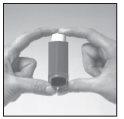
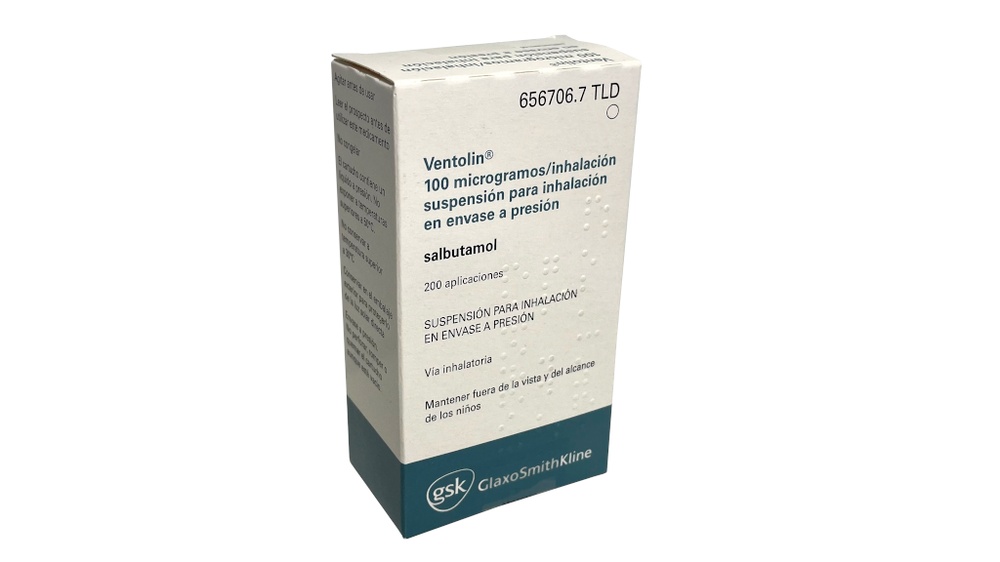
VENTOLIN 100 microgramas/INALAÇÃO SUSPENSÃO PARA INALAÇÃO EM EMBALAGEM COM PRESSÃO

Pergunte a um médico sobre a prescrição de VENTOLIN 100 microgramas/INALAÇÃO SUSPENSÃO PARA INALAÇÃO EM EMBALAGEM COM PRESSÃO

Como usar VENTOLIN 100 microgramas/INALAÇÃO SUSPENSÃO PARA INALAÇÃO EM EMBALAGEM COM PRESSÃO
Introdução
Prospecto: informação para o paciente
Ventolin 100 microgramas/inalação suspensão para inalação em envase a pressão
salbutamol
Leia todo o prospecto detenidamente antes de começar a usar este medicamento, porque contém informações importantes para si.
- Conserva este prospecto, porque pode ter que voltar a lê-lo.
- Se tiver alguma dúvida, consulte o seu médico ou farmacêutico.
- Este medicamento foi prescrito apenas para si, e não deve dá-lo a outras pessoas, mesmo que tenham os mesmos sintomas que si, porque pode prejudicá-las.
- Se experimentar efeitos adversos, consulte o seu médico ou farmacêutico, mesmo que se trate de efeitos adversos que não aparecem neste prospecto. Ver seção 4.
Conteúdo do prospecto
- O que é Ventolin e para que se utiliza
- O que precisa saber antes de começar a usar Ventolin
- Como usar Ventolin
- Posíveis efeitos adversos
- Conservação de Ventolin
- Conteúdo do envase e informação adicional
1. O que é Ventolin e para que se utiliza
Ventolin 100 microgramas/inalação suspensão para inalação em envase a pressão, está indicado em adultos, adolescentes e crianças de 4 a 11 anos (para crianças menores de 4 anos ver seção 3), nos seguintes casos:
- Medicamento de resgate no asma leve, moderada ou grave.
- Prevenção de broncoespasmo (dificuldade para respirar ou sibilância) induzido por exercício físico ou antes de expor-se a um estímulo alergénico conhecido e inevitável.
2. O que precisa saber antes de começar a usar Ventolin
Não use Ventolin
- se é alérgico a salbutamol ou a algum dos outros componentes deste medicamento (incluídos na seção 6).
- para deter o parto prematuro não complicado ou a ameaça de aborto.
Advertências e precauções
Consulte o seu médico ou farmacêutico antes de começar a usar Ventolin se:
- teve que deixar de utilizar este ou outro medicamento para o tratamento desta doença por alergia ou algum outro problema
- padece problemas de tensão alta
- padece hipertireoidismo (aumento da atividade da glândula tireoide)
- tem histórico de problemas de coração como ritmo cardíaco rápido ou irregular ou angina (dor no peito)
- tem níveis baixos de potássio no sangue
- está tomando derivados da xantina (como teofilina) ou esteroides para tratar o asma
- está tomando diuréticos, utilizados em ocasiões para o tratamento de hipertensão ou problemas de coração.
Seu médico controlará os seus níveis de potássio se estiver tomando derivados da xantina, esteroides ou diuréticos.
Consulte com o seu médicose achar que pode ter algum desses problemas.
Se o uso deste medicamento não lhe proporcionar alívio durante pelo menos três horas, consulte o seu médico. Algumas vezes este medicamento pode não ser adequado e o seu médico poderia querer mudá-lo por outro distinto.
Outros medicamentos e Ventolin
Informa ao seu médico ou farmacêutico se está tomando, tomou recentemente ou pudesse ter que tomar qualquer outro medicamento, mesmo os adquiridos sem receita médica.
Alguns medicamentos podem afetar o funcionamento de Ventolin ou fazer com que seja mais provável que você tenha efeitos adversos. Entre esses medicamentos incluem-se:
- Fármacos β-bloqueantes não seletivos como propranolol, utilizados para o tratamento de tensão alta ou problemas de coração.
- Inibidores da monoaminooxidase (imao), utilizados para o tratamento da depressão.
Seu médico ou farmacêutico decidirá se deve usar Ventolin com esses medicamentos.
Gravidez e lactação
Se está grávida ou em período de lactação, acha que poderia estar grávida ou tem intenção de ficar grávida, consulte o seu médico ou farmacêutico antes de utilizar este medicamento.
Se for necessário administrar Ventolin durante a gravidez ou no período de lactação, o seu médico avaliará cuidadosamente os benefícios e riscos potenciais em função da gravidade do quadro clínico.
Condução e uso de máquinas
Não se realizaram estudos sobre a capacidade de conduzir e usar máquinas.
Informação importante sobre alguns dos componentes de Ventolin
É possível que alguns pacientes possam notar alguma sensação ou sabor diferente em relação à formulação em inhalador de Ventolin que anteriormente utilizavam, devido a que se substituiu o propelente por um novo que não contribui para o esgotamento da camada de ozônio.
Uso em desportistas
Este medicamento contém salbutamol, que pode produzir um resultado positivo nas provas de controlo de dopagem.
3. Como usar Ventolin
Siga exatamente as instruções de administração deste medicamento indicadas pelo seu médico. Em caso de dúvida, consulte novamente o seu médico ou farmacêutico.
Lembre-se de usar o seu medicamento.
Seu médico indicará a duração do seu tratamento com Ventolin. Não suspenda o tratamento antes.
Este medicamento produz uma fina névoa que deve ser inalada nos pulmões. Certifique-se de que sabe utilizar o inhalador corretamente. Se tiver algum problema, pergunte ao seu médico ou farmacêutico.
A dose recomendada de início para aliviar os sintomas ou ataques agudos de asmaé:
Adultos:uma aplicação (100 microgramas) ou duas aplicações (200 microgramas), uma vez ao dia.
Crianças de 12 anos e maiores: uma aplicação (100 microgramas) ou duas aplicações (200 microgramas), uma vez ao dia.
Crianças menores de 12 anos:uma aplicação (100 microgramas) uma vez ao dia. Seu médico pode aumentá-la até duas aplicações (200 microgramas) uma vez ao dia.
A utilização de Ventolin a demanda não deve exceder quatro vezes ao dia. A necessidade de uso adicional ou um aumento repentino na dose indicam um agravamento da doença asmática.
A dose recomendada de início para prevenir os sintomas ou ataques de asma induzido por alérgenos ou por exercícioé:
Adultos:duas aplicações (200 microgramas) 10 a 15 minutos antes do exercício ou da exposição ao alérgeno.
Crianças de 12 anos e maiores:duas aplicações (200 microgramas) 10 a 15 minutos antes do exercício ou da exposição ao alérgeno.
Crianças menores de 12 anos:uma aplicação (100 microgramas) 10 a 15 minutos antes do exercício ou da exposição ao alérgeno. Seu médico pode aumentá-la até duas aplicações (200 microgramas) antes do exercício ou da exposição ao alérgeno.
A dose recomendada de início para o uso contínuo(junto com o medicamento anti-inflamatório habitual para o asma, corticosteroide inalado) é:
Adultos, crianças a partir de 12 anos e menores de 12 anos:uma aplicação (100 microgramas) ou duas aplicações (200 microgramas), uma vez ao dia.
A dose máxima é de 800 microgramas (duas inalações até quatro vezes em um período de 24 horas).
Não deve inalar mais aplicações ou utilizar o seu inhalador mais frequentemente do que o que o seu médico indicou.
Seu médico pode indicar que inale mais aplicações como tratamento de emergência se os seus “pitos” ou respiração piorarem. É importante que siga as instruções do seu médico quanto ao número de aplicações e à frequência das mesmas.
Algumas pessoas podem encontrar dificuldade em liberar uma aplicação justo antes de aspirar. As câmaras de inalação ajudam a solucionar este problema. Seu médico ou farmacêutico o aconselhará.
Os bebês e as crianças pequenas podem beneficiar-se do uso de Ventolin mediante o uso de uma câmara de inalação para pacientes pediátricos provida de uma máscara (como Babyhaler). Seu médico ou farmacêutico o aconselhará.
Se justo após a administração do medicamento a sua respiração ou a sua dificuldade para respirar começarem a piorar, deixe de utilizar imediatamente e avise o seu médico o mais rápido possível.
Ventolin deve ser utilizado a demanda e não de forma regular.
Se o seu asma está ativo (por exemplo, tem sintomas ou crises frequentes, como dificuldade para respirar que o dificulta falar, comer ou dormir, tosse, sibilância, opressão no peito ou capacidade física limitada), deve informar imediatamente o seu médico, que pode começar a administrar um medicamento ou aumentar a dose de tratamento, como um corticosteroide inalado, para controlar o seu asma.
Informa ao seu médico o mais rápido possível se o seu medicamento parece não estar funcionando tão bem como de costume (por exemplo, se precisa de doses mais altas para aliviar os problemas respiratórios ou se o seu inhalador não lhe proporciona alívio durante pelo menos 3 horas), porque o seu asma pode estar piorando e você pode precisar de um medicamento diferente.
Se utilizar Ventolin mais de duas vezes por semana para tratar os sintomas asmáticos, sem incluir o uso preventivo antes do exercício, isso indica um asma mal controlada e pode aumentar o risco de ataques de asma graves (agravamento do asma) que podem ter complicações sérias e podem por em risco a sua vida ou até ser mortais. Deve entrar em contacto com o seu médico o mais rápido possível para rever o tratamento do asma.
Se utilizar diariamente um medicamento contra a inflamação dos pulmões, p. ex., um “corticosteroide inalado”, é importante que continue a utilizá-lo com regularidade, mesmo que se sinta melhor.
Se achar que a ação de Ventolin é demasiado forte ou fraca, comunique ao seu médico ou farmacêutico.
Leia cuidadosamente estas instruções antes de utilizar o seu medicamento.
Instruções de uso:
Ventolin produz uma fina névoa que é inalada pela boca até os pulmões. Seu médico ou farmacêutico devem indicar-lhe como usar o dispositivo inalador. Em caso de dúvida, consulte o seu médico ou farmacêutico.
Verificação do inalador:
Antes de usar pela primeira vez o inalador, retire o protetor da boquilla apertando suavemente pelos lados, agite o inalador conscienciosamente e libere ao ar duas doses para assegurar deste modo o funcionamento do inalador. Se o inalador não foi utilizado durante 5 ou mais dias, agite-o conscienciosamente e libere ao ar 2 doses para assegurar-se de que funciona.
Uso do inalador:
- Retire o protetor da boquilla apertando suavemente pelos lados.
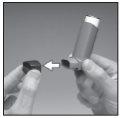
- Verifique que não há partículas estranhas por dentro e por fora do inalador, incluindo a boquilla.
- Agite bem o inalador para assegurar-se de que se elimina qualquer partícula estranha e que o conteúdo do inalador se mistura adequadamente.
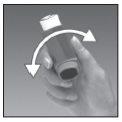
- Segure o inalador verticalmente entre os dedos índice e polegar, colocando o polegar sobre a base, por debaixo da boquilla. Eche tanto ar quanto razoavelmente se puder.
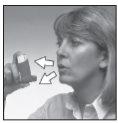
- Introduza a seguir a boquilla na boca, entre os dentes, fechando os lábios sobre o aparelho, mas sem morder.
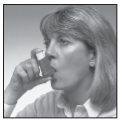
- Imediatamente após começar a tomar ar pela boca, pulse o inalador para liberar o salbutamol, e continue tomando ar profundamente e constantemente.
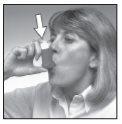
- Contenha a respiração, retire o inalador da boca e retire o dedo índice colocado na parte superior do inalador. Continue contendo a respiração tanto quanto razoavelmente se puder.
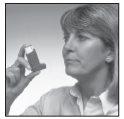
- Se for administrar outra inalação, mantenha o inalador vertical e espere durante aproximadamente meio minuto antes de repetir os passos 3 a 7.
- Coloque o protetor da boquilla empurrando firmemente e fechando de um golpe para que a tampa fique no seu lugar.
Importante
Não efetue rapidamente os passos 5, 6 e 7. É importante iniciar a respiração tão lentamente quanto se puder, justamente antes de pulsar o inalador. Pratique diante de um espelho as primeiras vezes. Se observar uma “espécie de névoa” saindo da parte superior do inalador ou dos lados da boca, comece de novo a partir do passo 2.
Os pacientes que encontrem dificuldade em coordenar o manuseio do inalador com a inalação podem utilizar uma câmara de inalação apropriada, Volumatic(adultos e crianças maiores de 5 anos) ou Babyhaler(crianças de 1 a 5 anos).
Em caso de que o médico tenha dado instruções diferentes, siga-as cuidadosamente. Consulte o médico ou farmacêutico se houver dificuldades.
Crianças:
As crianças pequenas podem precisar de ajuda, tendo um adulto que manuseie o inalador por elas. Anime a criança a echar o ar e accionar o inalador justo após a criança começar a tomar ar. Pratique juntos a técnica.
As crianças maiores ou as pessoas com mãos frágeis devem segurar o inalador com ambas as mãos; para isso, ponham os dois dedos índices na parte superior do inalador e os dois polegares na base, debaixo da boquilla.
Limpeza do inalador
Limpe o inalador uma vez por semana, pelo menos.
- Retire o cartucho metálico da carcassa de plástico do inalador e retire o protetor da boquilla.
- Enxágue a carcassa de plástico com água morna.
- Deixe secar a carcassa de plástico por dentro e por fora em um lugar morno, evitando o calor excessivo.
- Volte a colocar o cartucho metálico e o protetor da boquilla.
Pode acrescentar-se à água um detergente suave ou uma solução do tipo das usadas para limpar biberões. Enxágue conscienciosamente com água limpa antes de secar.
Não introduza o cartucho metálico em água.
Se usar mais Ventolin do que deve
Em caso de sobredosagem ou ingestão acidental, consulte imediatamente o seu médico ou farmacêutico ou ligue para o Serviço de Informação Toxicológica, telefone 91 562 04 20, indicando o medicamento e a quantidade ingerida.
Se acidentalmente tomar uma dose maior do que a recomendada, tem mais probabilidade de sofrer efeitos adversos como aceleração do ritmo cardíaco, dores de cabeça, tremores ou câimbras musculares (ver Posíveis efeitos adversos). Deve avisar o seu médico o mais rápido possível se a dose que você tomou é superior à recomendada.
Se esqueceu de usar Ventolin
Não tome uma dose dupla para compensar as doses esquecidas. Simplesmente inhale a próxima dose quando corresponder, ou antes se começar a notar que respira com dificuldade. Seu médico ter-lhe-á indicado que utilize o seu inhalador regularmente cada dia ou apenas quando a respiração piorar.
4. Efeitos adversos possíveis
Tal como todos os medicamentos, este medicamento pode produzir efeitos adversos, embora nem todas as pessoas os sofram.
Algumas pessoas podem ser alérgicas aos medicamentos. Se você experimentar algum dos seguintes sintomas imediatamente após utilizar Ventolin, interrompa o tratamento e avise seu médico o mais rápido possível.
Sintomas aos quais deve estar atento:
Reações alérgicas:são muito raras em pacientes que utilizam Ventolin. Incluem os sinais:
- aparição súbita de “pitos” ou opressão no peito
- inchação das pálpebras, face ou lábios
- erupção na pele (habões) ou urticária em qualquer parte do corpo
- sensação repentina de fraqueza ou tontura (pode conduzir a colapso ou perda de consciência).
Entre em contato com seu médico imediatamentese sofrer algum desses sintomas. Pare de utilizar Ventolin.
A seguir, são indicados os efeitos adversos associados ao salbutamol, classificados por órgão, sistema e frequência. O significado dos termos utilizados para descrever a frequência dos efeitos adversos é o seguinte:
Muito frequentes: podem afetar mais de 1 de cada 10 pacientes.
Frequentes: podem afetar até 1 de cada 10 pacientes.
Pouco frequentes: podem afetar até 1 de cada 100 pacientes.
Raros: podem afetar até 1 de cada 1.000 pacientes.
Muito raros: podem afetar até 1 de cada 10.000 pacientes.
Avise o médico se tiver algum dos seguintes sintomas:
Distúrbios do sistema imunológico
Muito raros: reações de hipersensibilidade (alérgicas) incluindo angioedema (reações cutâneas com eritema, edemas e prurido), urticária, broncoespasmo (estreitamento das paredes dos brônquios com diminuição da entrada de ar), hipotensão e colapso.
Distúrbios do metabolismo e da nutrição
Raros: hipocalemia (níveis baixos de potássio no sangue).
A terapia com agonistas β2 pode dar origem a uma hipocalemia potencialmente grave.
Distúrbios do sistema nervoso
Frequentes: tremor, cefaleia (dor de cabeça).
Muito raros: hiperatividade (agitação e excitabilidade).
Distúrbios cardíacos
Frequentes: taquicardia (aumento da frequência cardíaca).
Pouco frequentes: palpitações (ritmo cardíaco irregular).
Muito raros: arritmias cardíacas, incluindo fibrilação auricular, taquicardia supraventricular e extrasístoles (distúrbios do ritmo do coração).
Embora não se saiba exatamente com que frequência ocorre, algumas pessoas podem experimentar ocasionalmente dor no peito (devido a problemas de coração, como angina). Avise seu médico se desenvolver esses sintomas enquanto está sendo tratado com salbutamol, mas não pare de tomá-lo a menos que lhe digam que o faça.
Distúrbios vasculares
Raros: vasodilatação periférica (dilatação do tamanho dos vasos sanguíneos periféricos).
Distúrbios respiratórios, torácicos e mediastínicos
Muito raros: broncoespasmo paradoxal (estreitamento das paredes dos brônquios com diminuição da entrada de ar).
Distúrbios gastrointestinais
Pouco frequentes: irritação da boca e garganta.
Distúrbios musculoesqueléticos e do tecido conjuntivo
Pouco frequentes: cãibras musculares.
Comunicação de efeitos adversos:
Se experimentar qualquer tipo de efeito adverso, consulte seu médico ou farmacêutico, mesmo que se trate de possíveis efeitos adversos que não aparecem neste prospecto. Também pode comunicá-los diretamente através do Sistema Espanhol de Farmacovigilância de Medicamentos de Uso Humano: www.notificaRAM.es. Mediante a comunicação de efeitos adversos, você pode contribuir para fornecer mais informações sobre a segurança deste medicamento.
5. Conservação de Ventolin
Mantenha este medicamento fora da vista e do alcance das crianças.
Não conserve a temperatura superior a 30ºC. Não congele. Conservar no embalagem exterior para protegê-lo da luz solar direta.
Coloque o protetor da boquilha firmemente e encaixe-o para que fique no lugar.
Se o inhalador estiver muito frio, retire o cartucho e aqueça com a mão durante alguns minutos antes de usar. Não utilize nenhum outro método para aquecê-lo.
O cartucho contém um líquido a pressão. Não exponha a temperaturas superiores a 50ºC. Não perfure, rompa ou queime o cartucho, mesmo que esteja vazio.
Não utilize este medicamento após a data de validade que aparece no envase após CAD. A data de validade é o último dia do mês que se indica.
Os medicamentos não devem ser jogados nos deságues nem na lixeira. Deposite os envases e os medicamentos que não precisa no Ponto SIGRE da farmácia. Em caso de dúvida, pergunte a seu farmacêutico como se livrar dos envases e dos medicamentos que não precisa. Dessa forma, você ajudará a proteger o meio ambiente.
6. Conteúdo do envase e informações adicionais
Composição de Ventolin 100 microgramas/inalação suspensão para inalação em envase a pressão
- O princípio ativo é 100 microgramas de salbutamol (como salbutamol sulfato) por aplicação.
- Os demais componentes são norflurano (HFA134a).
Este medicamento contém gases fluorados de efeito estufa.
Cada inhalador contém 18 g de HFC-134a (também conhecido como norflurano ou HFA 134a) que correspondem a 0,0257 toneladas de CO2 equivalente (potencial de aquecimento global PCG = 1 430).
Aspecto do produto e conteúdo do envase
Cada envase contém um inhalador que fornece 200 aplicações.
Titular da autorização de comercialização e responsável pela fabricação
Titular da autorização de comercialização:
GlaxoSmithKline, S.A.
P.T.M. C/ Severo Ochoa, 2
28760 Tres Cantos (Madrid)
Tel: +34 900 202 700
Responsável pela fabricação:
Glaxo Wellcome, S.A.
Avda. de Extremadura, 3
09400 – Aranda de Duero (Burgos)
Ou
Glaxo Wellcome Production
Zone Industrielle nº 2, 23 Rue Lavoisier, La Madeleine, 27000 Evreux, França.
Tel: + 33 2 3223 5500
Fax: +33 2 3223 5558
Data da última revisão deste prospecto: 01/2025
A informação detalhada e atualizada deste medicamento está disponível na página Web da Agência Espanhola de Medicamentos e Produtos Sanitários (AEMPS) http://www.aemps.gob.es/

Quanto custa o VENTOLIN 100 microgramas/INALAÇÃO SUSPENSÃO PARA INALAÇÃO EM EMBALAGEM COM PRESSÃO em Espanha em 2025?
O preço médio do VENTOLIN 100 microgramas/INALAÇÃO SUSPENSÃO PARA INALAÇÃO EM EMBALAGEM COM PRESSÃO em dezembro de 2025 é de cerca de 4.09 EUR. Os valores podem variar consoante a região, a farmácia e a necessidade de receita. Confirme sempre com uma farmácia local ou fonte online para obter informações atualizadas.
- País de registo
- Preço médio em farmácia4.09 EUR
- Substância ativa
- Requer receita médicaSim
- Fabricante
- Esta informação é apenas para referência e não constitui aconselhamento médico. Consulte sempre um médico antes de tomar qualquer medicamento. A Oladoctor não se responsabiliza por decisões médicas baseadas neste conteúdo.
- Alternativas a VENTOLIN 100 microgramas/INALAÇÃO SUSPENSÃO PARA INALAÇÃO EM EMBALAGEM COM PRESSÃOForma farmacêutica: INALAÇÃO PULMONAR, 0.12% P/V SULFATO DE SALBUTAMOLSubstância ativa: salbutamolFabricante: Laboratorio Aldo Union S.L.Requer receita médicaForma farmacêutica: INALAÇÃO PULMONAR, 0.24% p/v SULFATO DE SALBUTAMOLSubstância ativa: salbutamolFabricante: Laboratorio Aldo Union S.L.Requer receita médicaForma farmacêutica: INALAÇÃO PULMONAR, 100 microgramas/aplicaçãoSubstância ativa: salbutamolFabricante: Laboratorio Aldo Union S.L.Requer receita médica
Alternativas a VENTOLIN 100 microgramas/INALAÇÃO SUSPENSÃO PARA INALAÇÃO EM EMBALAGEM COM PRESSÃO noutros países
As melhores alternativas com o mesmo princípio ativo e efeito terapêutico.
Alternativa a VENTOLIN 100 microgramas/INALAÇÃO SUSPENSÃO PARA INALAÇÃO EM EMBALAGEM COM PRESSÃO em Польша
Alternativa a VENTOLIN 100 microgramas/INALAÇÃO SUSPENSÃO PARA INALAÇÃO EM EMBALAGEM COM PRESSÃO em Украина
Médicos online para VENTOLIN 100 microgramas/INALAÇÃO SUSPENSÃO PARA INALAÇÃO EM EMBALAGEM COM PRESSÃO
Avaliação de posologia, efeitos secundários, interações, contraindicações e renovação da receita de VENTOLIN 100 microgramas/INALAÇÃO SUSPENSÃO PARA INALAÇÃO EM EMBALAGEM COM PRESSÃO – sujeita a avaliação médica e regras locais.




